

 |
 |
![INDEX[1] < PTJ2022S/S > to be held in Tokyo ! Premium Textile Japan 2022 Spring/Summer](images/title_index_01.gif) 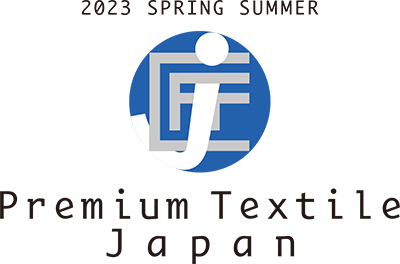 The < Premium Textile Japan (PTJ) Spring/Summer 2023 > event, organised by JFW (Japan Fashion Week Organization), will be held at the Tokyo International Forum /Exhibition Hall E (Chiyoda Ward, Tokyo Prefecture) on May 25-26, subject to full compliance with safety rules and measures to prevent COVID-19 infection.
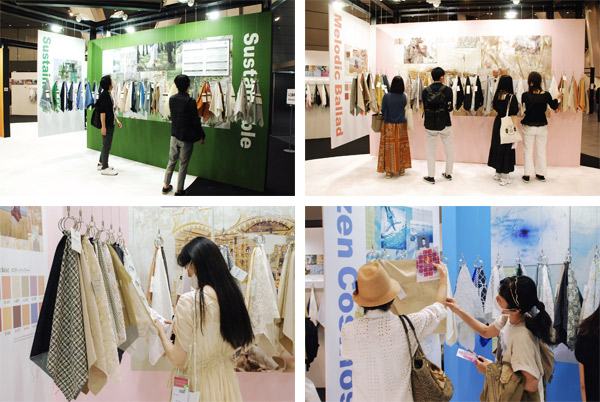
Photo:PTJ2022SS ![INDEX[2] Enhancing new product development and seeking business opportunities](images/title_index_02.gif) The < Premium Textile Japan (PTJ) Spring/Summer 2023 > event, organised by JFW (Japan Fashion Week Organization), will be held from May 25-26 at the Tokyo International Forum / Exhibition Hall E-1 and is set to host 71 exhibitors, three of whom new, occupying 92 booths on this occasion. We are also delighted to announce that the well-reputed projects; < JFW Sustainability Project > and < JFW Textile Online Salon > will continue as ongoing initiatives. COVID-19 has had a considerable impact on the textile industry. Compounding this, many exhibitors cite their main concern as ‘the recent rise in raw material costs.’ Businesses are pondering whether to pass on product price increases amid near-monthly cost hikes due to the soaring cost of naphtha. The same applies to natural fibres, which are severely affected by ever-costlier raw materials. Amid such challenges, certain exhibitors are still striving to enhance the cultivation of new customers by rolling out new products as follows: Mipox Corporation <D-71> *New exhibitor Promoting multicoloured reflective materials Mipox is globally renowned as the top Japanese-affiliated polishing maker. Their dispersion technique for polymer/semiconductor materials, including resins, alongside coating techniques in the production process are utilised efficiently to develop reflective materials. This includes thin-type and unbreakable reflectors, for example, which leverage techniques normally used to produce semiconductors. Assisted by fashion designers and brand consultants, they have striven to develop unconventional reflectors with sociality in mind, including seasonal/environmental issues, to propose unique reflectors that are thinner and lighter than ever. They can even meet the most stringent customer requests for specific colours using their toning technique. On show for their PTJ debut are items including the < Ref Lite8000 > series; a 20-colour set of reflective clothing kept always in stock and encompassing a wide-ranging spectrum. Other highlights include < Ref Lite Softlite Plus > - a reflector designed for the fashion industry, which eliminates stiffness, bends easily for piping and can be easily sewn. Meanwhile, their original product repertoire also includes < ECOPET >, featuring cooperation by TEIJIN FRONTIER, to meet the need for a low environmental impact, even with reflexive materials.  RAINBOW WORLD CO., LTD. <C-62> *New exhibitor A comprehensive print maker RAINBOW WORLD from Noshiro City, Akita Prefecture, will also join PTJ for the first time with its own one-stop production facility, handling printing, washing, finishing and sewing for the handkerchiefs, stoles and other items on offer. In fact, they offer printing across the board, including automatic flat-screen printing, hand printing and inkjet printing, paving the way to accept a wide range of fabric categories and small-scale batches to mass production. On this occasion, visitors can check out their double-sided inkjet prints (integrated duplex) using reactive dye for cotton and silk. Another must-see: a uniquely developed natural plant-dyed fabric, using the regional resource of Akita cedar from Noshiro City, with dye extracted from its leaves as a raw material processed by hand screen printing in house. COVID-19 has imposed severe pressures on the textile industry in multiple areas: declining sales and costlier fuel and raw materials due to surging crude oil prices. Despite this, the company intends to meet the challenge to ‘boost company awareness and nurture new customers’ head-on by participating in PTJ. As part of their contribution to environmental issues, they tackle ‘boosting boiler fuel efficiency by collecting heat exchangers and drains, alongside sustainable production by reducing CO2 emissions.’ 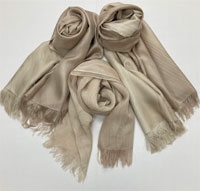
Akita cedar print stall MOELAN STUDIO CO., LTD. <C-2> *New exhibitor Specialised in digital prints Moelan Studio, a newly exhibiting company, is GOTS-certified and specialises in digital printing techniques; retaining appealing features, a high design standard by textile designers and abundant pattern variations. They launch an average of 70-100 patterns per season and a total of 400 or so patterns each year. Alongside mastery of design and planning, they also offer scope to manufacture the finest products using the latest digital printing machine, the only one of its kind available in Japan. They also strive to minimise waste liquids and save water during the production process, while eliminating loss in sales by applying an online order system. All the while, environmental considerations remain top of mind. Exhibits include soft-touch twill that is smoothly textured; combining the ultra-breathable < Lenzing ECOVERO > and sustainable < TRUE COTTON > material, alongside a fluid and near-translucent typewriter fabric blending < Lenzing ECOVERO > and organic cotton. Orders from as few as 10 meters are also accommodated, helping to ease stock risks of clients. 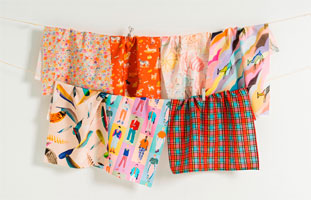 ASAKI CO., LTD. <A-24> Leveraging strength originating from the Niigata textile region Located in the Niigata region, ASAKI was founded in 1869 and deals with knitted/woven fabrics and raw threads. With their own weaving factory and with scope to produce from dyeing yarns, they handle the full range of services from their home region, from weaving to post-processing including finishing. They are equally flexible in handling wide-ranging textile categories and types; from natural fibres to compound fabrics with synthetics for casual to elegant applications as required. By participating in PTJ, they hope to ramp up activities ‘to acquire new customers, expand sales channels and widely promote the Niigata textile region.’ On this occasion, they will present check fabrics using an unevenly dyed organic cotton, unique to the Niigata region and blending twisted yarns for a cool and fresh feel. Other highlights include crepe fabrics using blended yarns; cotton for warp and recycled polyester for weft, which retain their crease effect in a vertical direction, alongside newly developed fabrics using blended yarns; cotton for warp, cotton/linen for weft and washer-processed. All of which offering the same familiar cool and fresh feel; further interwoven with sashiko-like stitches for unique surface changes on the fabric. In terms of sustainability initiatives, the main current focus lies on developing stock products and fabric proposals that leverage recycled and bio-based raw materials and centre on organic raw materials. 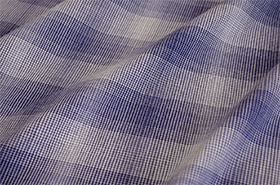 KAGEYAMA CO., LTD. <A-14> Undyed check & stripe fabrics KAGEYAMA mainly deals with yarn-dyed fabrics, as a local textile trader flying the flag for the BANSHU (Banshu-Ori) textile hub. Via a pair of production facilities in Japan and China, they handle a highly original product range on a made-to-order basis as well as stock for which they assume risk; cementing their advantage. They underline their absolute commitment to provide clients with swift deliveries. On this occasion, they will showcase check- and stripe-patterned fabrics using undyed yarns. Namely, no dye is used to optimise the original natural raw cotton tones (shades of brown and green) and further blending hard-twisted yarns for warp for an earthier and more natural look. Underlining their sustainability credentials is a fabric woven with hemp and organic for warp and weft, remaining smooth thanks to the soft cotton content and available in three natural colours: white, blue and green. Conversely, eco ripple seersucker is woven using raw threads of organic cotton and recycled polyester for a comfortable soft-touch feel, featuring a rippled finish that minimises the surface area touching the skin, however humid it gets outside.  ![INDEX[3] JAPAN Trends “JFW TEXTILE VIEW 2023 Spring/Summer”](images/title_index_03.gif) < Innate qualities and personal values - anchored to the sense of self >  ![INDEX[4] JFW Textile Online Salon <JTO>](images/title_index_04.gif)  “JFW Textile Online Salon (JTO)” enables you to search and get digitalized information on textile collection presented by exhibitors. Take full advantage of this for your textile business to retrieve your targeting textile information whenever and wherever you need.  
|
This e-mail magazine is sent to all individuals having visited our show, JFW-Japan Creation in the past and/or who have registered for an e-mail magazine subscription on the website as well as to all members concerned. |
Published by : The JFW Japan Fashion Week Organization Textile Div. |